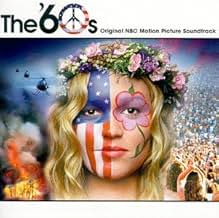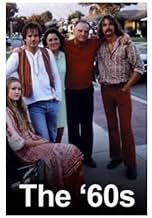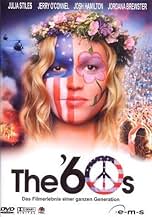NOTE IMDb
6,9/10
2,7 k
MA NOTE
Ajouter une intrigue dans votre langueThe events of the 1960s affect the lives of two families, one white and one black.The events of the 1960s affect the lives of two families, one white and one black.The events of the 1960s affect the lives of two families, one white and one black.
- Nommé pour 3 Primetime Emmys
- 2 victoires et 10 nominations au total
Parcourir les épisodes
Avis à la une
I enjoyed the plot, The cast did a great job. If you ever seen Woodstock. This is in your ball park. The soundtrack is just as good as the movie. Julia Stiles proves that she is a great actress, Jerry O'Connell once again has proven his talent as an actor. This is one not to miss. If you did you wish you hadn't.
Oh well - this series is crap, i mean, absolutely. They should have been awarded for worst script, worst acting, worst interpretation of history, worst use of stereotypes, worst use of a fake mustache in an attempt to duplicate the Tom Cruise of the 4th July - but, miracle!, making him walk - worst cinematography, worst art directing, worst costumes, worst editing, worst leftism (i mean, this is how you lived your '68? You shoulda stayed home! C'mon dude, where's the politics), worst use of Bob Dylan clips (clips from the seventies in a sixties movie?). If you wanna be a die-hard nostalgic hippie substantially not caring about most of the political facets of it, if you can't read a book or you'd fall asleep, if you hate documentaries, if Woodstock to you is a little yellow bird, if you want to see some 80s haircuts misplaced in time, well this might be for you. I mean, Hair was a musical, a fantastic movie, it was not intended to be a portrait of a generation - but hell, it was 1000 times more realistic than this. Hey, if all the people in the USA during the sixties were dumb as the characters of this crap i think at least somebody had a good reason to fly to Vietnam: not hearing anything anymore from dummies country! I guess the sixties were definitely better than this, but, i mean, what was the worst year in the whole history? The less interesting year of all time? I don't know, but put that year in the hands of a medium-level director and he'll do something more enjoyable. Shame on whoever worked on this - none of you did a good job!
What the movie The 60s really represents (to those of us who growled around in the belly of America in those times) is the turbulence and diversity of the decade. Despite the exaggerated, stereotyped characters, the genuineness of the issues remains clear.
Not only were those radical times of change, but also very confusing times. Two basic things changed our world then: the 1964 Civil Rights Act, and the overwhelming influence of the media. Those two new freedoms began social changes that soon became institutionalized.
From chaos came sensitivity, from disorder came values. Bear in mind however, that the bulk of Americans were not involved in this... they worked, they played, they watched the news... and slowly they became effected by the efforts and struggles of the minorities... the Civil Rights workers, the Political Activists, the Anti-War efforts, the War on Poverty....
The representation of the power of the press and TV in particular, was well reflected, although the conflict between the general public's attitude and those seeking to change things was at best ignored... and at worst, misrepresented.. Middle class Americans weren't all standing around angrily holding baseball bats, or disowning their wayward daughters. They were confused too. Let us not forget how Folk Singers suddenly became Protest Singers, and how The Beatles began an onslaught that killed the Folk-Protest Movement. There are no Beatle songs in the movie, or even any mention of them.
I think if you didn't live the decade, you might not have a sense of what the movie is about, the overall picture is a bit dim. At one point I held down a steady job while my sister lived at the Hog Farm Commune and went to Woodstock. At another point I was in Haight Asbury and in the Detroit Riots while she worked and played the housewife in Maine and Connecticut. Roles were constantly changing.
The movie depicts three siblings of a middle class family. They represent the hippie child, the political activist, and the active military personnel. Dad represents the typical attitudes, and mom represents the voice of reason, tolerance, and sometimes compromise... for the sake of peace.
The Black family comprises a minister and his son... disproportionately, I think. I assume the producers knew all the variables and had to settle on limitations, or else the film would have become a long, boring, documentary. Dad's message was that anger produces bitterness, and bitterness produces chaos. It was clearly a message directed to today's youth.
We are looking at a unique solution to social problems, and also how issues divide us... The 60s were unusual in that way, and only the Roaring 20s compare. In other words, this movie has a moral after all. In the end, it is our Collective Individualism that survives. Put that in your oxymoron list.
Everyone was a God, a Guru, or a free-spirited genius in the 60s. It was a time of magic and madness. No one will ever nail the 60s down right... it was too diverse (this movie is close). At least we can say we are not ashamed of it, that we learned and grew from it, and that for once, a generation shaped and changed America... for the better.
Not only were those radical times of change, but also very confusing times. Two basic things changed our world then: the 1964 Civil Rights Act, and the overwhelming influence of the media. Those two new freedoms began social changes that soon became institutionalized.
From chaos came sensitivity, from disorder came values. Bear in mind however, that the bulk of Americans were not involved in this... they worked, they played, they watched the news... and slowly they became effected by the efforts and struggles of the minorities... the Civil Rights workers, the Political Activists, the Anti-War efforts, the War on Poverty....
The representation of the power of the press and TV in particular, was well reflected, although the conflict between the general public's attitude and those seeking to change things was at best ignored... and at worst, misrepresented.. Middle class Americans weren't all standing around angrily holding baseball bats, or disowning their wayward daughters. They were confused too. Let us not forget how Folk Singers suddenly became Protest Singers, and how The Beatles began an onslaught that killed the Folk-Protest Movement. There are no Beatle songs in the movie, or even any mention of them.
I think if you didn't live the decade, you might not have a sense of what the movie is about, the overall picture is a bit dim. At one point I held down a steady job while my sister lived at the Hog Farm Commune and went to Woodstock. At another point I was in Haight Asbury and in the Detroit Riots while she worked and played the housewife in Maine and Connecticut. Roles were constantly changing.
The movie depicts three siblings of a middle class family. They represent the hippie child, the political activist, and the active military personnel. Dad represents the typical attitudes, and mom represents the voice of reason, tolerance, and sometimes compromise... for the sake of peace.
The Black family comprises a minister and his son... disproportionately, I think. I assume the producers knew all the variables and had to settle on limitations, or else the film would have become a long, boring, documentary. Dad's message was that anger produces bitterness, and bitterness produces chaos. It was clearly a message directed to today's youth.
We are looking at a unique solution to social problems, and also how issues divide us... The 60s were unusual in that way, and only the Roaring 20s compare. In other words, this movie has a moral after all. In the end, it is our Collective Individualism that survives. Put that in your oxymoron list.
Everyone was a God, a Guru, or a free-spirited genius in the 60s. It was a time of magic and madness. No one will ever nail the 60s down right... it was too diverse (this movie is close). At least we can say we are not ashamed of it, that we learned and grew from it, and that for once, a generation shaped and changed America... for the better.
oh ya, I was there and can vouch for the veracity of many of the scenes in this series. My background was that of a naive shy geeky type and it took me a long time to come to terms with what happened during the 60s. A time of very rapid and huge social change. The course of the decade is mirrored in the story presented in this excellent representation. The remnants of the bobbysoxer era gave way to some pretty horrid psychedelic tunes but then Jimi Hendrix hit the air waves. His legacy will in 200 years be similar to Amadeus Mozart: they both revolutionized music, lived on the edge, died young and broke. The difference is we have Jimi's live recordings and know his resting place. The characters then undergo some defining moments, and the war in southeast Asia spills over. The end of the film was rather abrupt and bewildering, same goes for that decade. I was there when the hippie era ended in a similar fashion.
Plausibility of this story ranges from dead on to highly unlikely. But you have to remember the hippie era was partly based on a lot of media hype and voyeurism. This range of views is correctly portrayed.
Julia Stiles was uniquely outstanding in her role as the wayward daughter who struggles against the downside of a society that in some cases was determined to devour its young. I too was kicked out of the house at a young age but I deserved it having chosen to sport long hair and argue with my parents at every opportunity. Fortunately I had a job at the time and all was forgiven eventually. Gee, thats exactly what happens in this movie. Its no wonder Ms Stiles has gone on to many more film projects and I hope to see her in roles that extend her talent.
Out of all the portrayals I have seen of that period, 'The 60s' is the most accurate. I was there, I should know. I even lived in a hippie house the summer of 1970. It was a farm house converted to a non-denominational church and some teens from around Canada and one chap from Jamaica were there on an exchange program. Music, motorcycles, pot, hitch-hikers, stern faced members of the establishment, oh ya, I had some flashbacks watching this one.
You can look back but you can never go back.
Plausibility of this story ranges from dead on to highly unlikely. But you have to remember the hippie era was partly based on a lot of media hype and voyeurism. This range of views is correctly portrayed.
Julia Stiles was uniquely outstanding in her role as the wayward daughter who struggles against the downside of a society that in some cases was determined to devour its young. I too was kicked out of the house at a young age but I deserved it having chosen to sport long hair and argue with my parents at every opportunity. Fortunately I had a job at the time and all was forgiven eventually. Gee, thats exactly what happens in this movie. Its no wonder Ms Stiles has gone on to many more film projects and I hope to see her in roles that extend her talent.
Out of all the portrayals I have seen of that period, 'The 60s' is the most accurate. I was there, I should know. I even lived in a hippie house the summer of 1970. It was a farm house converted to a non-denominational church and some teens from around Canada and one chap from Jamaica were there on an exchange program. Music, motorcycles, pot, hitch-hikers, stern faced members of the establishment, oh ya, I had some flashbacks watching this one.
You can look back but you can never go back.
Generally, whenever I watch the networks attempt to depict American History I wind up on the front lawn randomly swearing at autos that pass my house, (until my wife turns on the sprinklers and forces me back inside.) But in spite of a few eye-rolling plot twists and cheesy lines, this is one of the very best docudramas I've EVER watched. Starting with the idealism of JFK, this movie is jam-packed full of references to a plethora of real historical events and personalities that defined the 1960s. Every single event and person is not flagged and explained. If you get it you get it, if you don't you don't. The better-read the viewer is, the more they will appreciate the numerous references. Abby Hoffman, Jerry Rubin, Tom Hayden, electric Dylan at Newport, Joan Baez, Martin Luther King, the Lorraine Motel, Wavy Gravy, the Zapruder Film, Bull Connor, Bobby Seale, Black Panther breakfast program, "Soul on Ice," "Free Huey," The Hog Farm, The Gray Line Bus tours of Haight-Ashbury, the Weathermen, The Chicago Seven, Selma, Birmingham, "brown acid," Days of Rage, CO status, Watts riot, Cafe Wha?, Phil Ochs, Kettle of Fish, and on and on and on. If you are extremely literate in the real history of the Sixties you will find a wealth of information awaiting you in this 3 and-a-half hour tour. All right, so "Do You Believe in Magic" wasn't released until AFTER the troop train protest was held in Berkley but that is a minor point to get all steamed up over. Generally this is a feast for the literate student of the 1960s.
Le saviez-vous
- AnecdotesActors Donovan Leitch Jr. and Carnie Wilson are the respective children of musicians Donovan and The Beach Boys' singer and composer Brian Wilson, both of whom are heard in the soundtrack. Jason Nesmith, son of ex-Monkee Michael Nesmith, also appears.
- GaffesAt the end during the BBQ, the mother asked "How's my boy today?" there is a boom mic visible.
- Citations
Bill Herlihy: Are you still my baby?
Katie Herlihy: No, dad, I grew up. But I am still your daughter.
- Versions alternativesA scene where Katie and her friends gathered in front of her television to watch The Beatles performance on the Ed Sullivan show was originally shown in NBC's first broadcast of the mini-series but ended up getting cut out of all the home video versions of the film (including NBC's own 2 tape set which could only be ordered straight from the network). The scene is also missing from later presentations of the film on networks such as VH1. In the scene Katie and her friends sit on the floor in front of the television and scream in delight at the sight of The Beatles while Katie's brother, Michael, sits behind them secretly trying to brush his hair down so that he can look like the famous quartet.
- ConnexionsFeatured in The 51st Annual Primetime Emmy Awards (1999)
Meilleurs choix
Connectez-vous pour évaluer et suivre la liste de favoris afin de recevoir des recommandations personnalisées
- How many seasons does The '60s have?Alimenté par Alexa
Détails
Contribuer à cette page
Suggérer une modification ou ajouter du contenu manquant



































